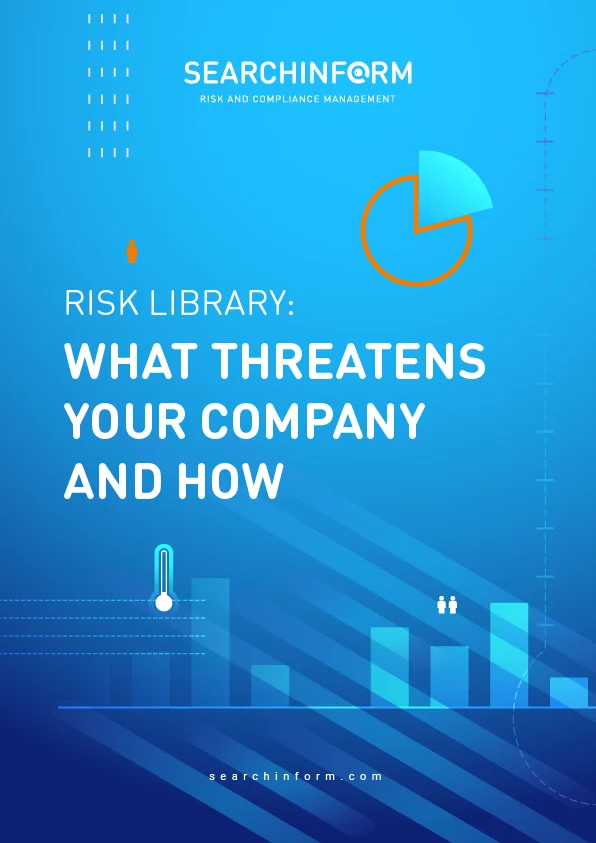Unraveling the Complexity
of HIPAA Violations
- What Is a HIPAA Violation?
- Types of HIPAA Violations
- Unauthorized Disclosure or Access:
- Inadequate Data Security Measures:
- Improper Disposal of PHI:
- Lost or Stolen Devices Containing PHI:
- Denial of Patient Access to PHI:
- Insufficient Employee Training:
- Lack of Business Associate Agreements (BAA):
- Failure to Conduct Risk Assessments:
- Breach Notification Failures:
- Patient Privacy Breaches:
- Consequences of HIPAA Violations
- How to Avoid HIPAA Violations With SearchInform
What Is a HIPAA Violation?
A HIPAA violation refers to any breach or failure to comply with the regulations outlined in the Health Insurance Portability and Accountability Act (HIPAA). HIPAA sets forth strict standards for the protection of individuals' protected health information (PHI), aiming to ensure its confidentiality, integrity, and availability. Violations can occur in various forms, including unauthorized disclosure of PHI, inadequate data security measures, improper disposal of PHI, denial of patient access to their own medical records, lack of employee training, failure to establish business associate agreements, neglecting risk assessments, breach notification failures, and breaches of patient privacy. Depending on the severity and intent of the violation, penalties for HIPAA violations can range from fines to criminal charges. Compliance with HIPAA regulations is crucial for maintaining the privacy and security of individuals' health information and upholding trust within the healthcare system.
Types of HIPAA Violations
HIPAA violations can be categorized into several types based on the nature of the breach and the specific HIPAA requirements that were violated. Here are some common types of HIPAA violations:
Unauthorized Disclosure or Access:
This category encompasses instances where protected health information (PHI) is accessed, used, or disclosed by individuals or entities without proper authorization. Unauthorized disclosure or access to PHI is a serious breach of confidentiality and violates HIPAA regulations. Examples of unauthorized disclosure include sharing patient information with unauthorized personnel, such as friends or family members, accessing medical records out of curiosity, or using PHI for non-medical purposes, such as marketing or research without patient consent. Whether intentional or inadvertent, any breach of confidentiality constitutes a violation of HIPAA and can result in penalties.
Inadequate Data Security Measures:
HIPAA mandates that covered entities implement robust safeguards to protect PHI from unauthorized access, alteration, or destruction. Violations in this category arise from insufficient data security measures, which leave PHI vulnerable to breaches. Common examples include inadequate encryption of electronic PHI, weak password practices, lack of access controls to limit who can view or modify PHI, and failure to regularly audit systems for vulnerabilities. Without adequate data security measures in place, PHI is at risk of being compromised, leading to potential violations of HIPAA regulations and exposing individuals' health information to unauthorized access.
Improper Disposal of PHI:
Proper disposal of physical documents containing PHI is essential to prevent unauthorized access and protect patient privacy. Violations occur when medical records, prescription forms, or other sensitive documents containing PHI are discarded without proper shredding or destruction. Improper disposal methods leave PHI vulnerable to unauthorized retrieval, potentially leading to breaches of confidentiality. Covered entities must ensure that PHI is disposed of securely to comply with HIPAA regulations and safeguard individuals' health information from unauthorized access or disclosure.
Lost or Stolen Devices Containing PHI:
In today's digital age, electronic devices such as laptops, smartphones, tablets, and portable storage devices often contain vast amounts of sensitive information, including PHI. When these devices are lost or stolen, there is a risk that unsecured PHI may be accessed by unauthorized individuals. HIPAA requires covered entities to implement safeguards such as encryption and remote wiping mechanisms to protect PHI stored on electronic devices. Failure to encrypt devices or implement adequate security measures can result in HIPAA violations if lost or stolen devices contain unsecured PHI, compromising the confidentiality and integrity of individuals' health information.
Denial of Patient Access to PHI:
HIPAA grants individuals the right to access their own medical records and request copies of their PHI from covered entities. Denying or impeding patient access to PHI constitutes a violation of HIPAA regulations. Covered entities are required to provide patients with timely access to their medical records, subject to certain exceptions. Failure to fulfill patient access requests or imposing unreasonable barriers to access violates individuals' rights under HIPAA and can result in penalties for covered entities.
Its discovery entails:
Insufficient Employee Training:
Covered entities are obligated to educate their workforce on HIPAA regulations and the proper handling of PHI to ensure compliance and protect patient privacy. Insufficient employee training leaves staff members unaware of their responsibilities and increases the risk of inadvertent violations. Examples of inadequate training include failure to educate employees on HIPAA privacy and security rules, improper handling of PHI, and lack of awareness about the consequences of non-compliance. Covered entities must provide comprehensive training programs to ensure that employees understand their obligations under HIPAA and are equipped to protect individuals' health information from unauthorized access or disclosure.
Lack of Business Associate Agreements (BAA):
Covered entities are required to enter into written agreements with business associates who may handle PHI on their behalf. These business associate agreements (BAAs) outline the responsibilities of the business associate regarding the protection and safeguarding of PHI. Failure to establish BAAs or ensure compliance with HIPAA regulations by third-party vendors can lead to violations. Covered entities must take steps to ensure that business associates understand their obligations under HIPAA and implement appropriate safeguards to protect PHI from unauthorized access or disclosure.
Failure to Conduct Risk Assessments:
HIPAA mandates that covered entities conduct regular risk assessments to identify vulnerabilities in the handling of PHI and implement appropriate safeguards to mitigate risks. Failure to conduct risk assessments or address identified risks can result in violations of HIPAA regulations. Covered entities must assess the security risks associated with the storage, transmission, and handling of PHI and take steps to safeguard individuals' health information from unauthorized access, alteration, or destruction. Failure to conduct risk assessments leaves PHI vulnerable to breaches and compromises the confidentiality and integrity of individuals' health information.
Breach Notification Failures:
Covered entities are required to notify affected individuals and relevant authorities in the event of a breach involving PHI. HIPAA specifies requirements for breach notification, including the timing and content of notifications. Failure to adhere to breach notification requirements within the specified timeframes constitutes a violation of HIPAA regulations. Covered entities must promptly investigate breaches, determine the scope of the breach, and notify affected individuals and authorities to mitigate the potential risks associated with unauthorized access or disclosure of PHI.
Patient Privacy Breaches:
HIPAA regulations are designed to protect patient privacy and prevent unauthorized access or disclosure of PHI. Violations occur when patient privacy is compromised, whether through unauthorized access to medical records, discussions about patient conditions in public settings, or the use of PHI for personal gain. Covered entities must implement safeguards to protect patient privacy and ensure that PHI is accessed and disclosed only for authorized purposes. Failure to maintain patient privacy violates HIPAA regulations and can result in penalties for covered entities.
Each type of violation carries its own set of consequences, ranging from monetary fines to potential criminal charges, depending on the severity and circumstances of the violation. It's essential for covered entities and their business associates to understand and comply with HIPAA regulations to protect the privacy and security of individuals' health information.

Consequences of HIPAA Violations
Consequences of HIPAA violations can vary depending on the severity and circumstances of the breach. Here are some potential repercussions:
- Civil Monetary Penalties (CMPs): The Office for Civil Rights (OCR), the federal agency responsible for enforcing HIPAA, can impose civil monetary penalties on covered entities found to be in violation of HIPAA regulations. These penalties can range from $100 to $50,000 per violation, depending on factors such as the entity's level of culpability and the harm caused by the violation. The maximum annual penalty for all violations of an identical provision is $1.5 million.
- Corrective Action Plans (CAPs): In addition to CMPs, the OCR may require covered entities to implement corrective action plans to address deficiencies identified during investigations of HIPAA violations. Corrective action plans typically involve implementing new policies and procedures, conducting additional training for staff, and enhancing security measures to prevent future violations.
- Criminal Penalties: In cases of willful neglect or deliberate misuse of PHI, individuals may face criminal penalties, including fines and imprisonment. Criminal penalties can range from $50,000 to $250,000 in fines and up to 10 years in prison, depending on the severity of the violation.
- Loss of Reputation and Trust: HIPAA violations can damage the reputation and trustworthiness of covered entities in the eyes of patients, partners, and the public. News of a HIPAA breach can lead to negative publicity, loss of business, and erosion of patient trust, which can have long-term consequences for the organization's viability and success.
- Lawsuits and Legal Costs: Covered entities may face lawsuits from individuals affected by HIPAA breaches, seeking damages for harm caused by the unauthorized disclosure or misuse of their PHI. Legal defense costs, settlements, and damages awarded in lawsuits can be substantial, resulting in financial strain for the organization.
- Regulatory Oversight and Audits: Following a HIPAA violation, covered entities may be subject to increased regulatory oversight and audits by the OCR to ensure compliance with HIPAA regulations. These audits can be time-consuming and resource-intensive, requiring the organization to provide documentation and evidence of compliance with HIPAA requirements.
- Loss of Government Funding and Contracts: Covered entities that receive funding from federal programs such as Medicare or Medicaid may face consequences for HIPAA violations, including the loss of government funding or contracts. This can have significant financial implications for the organization and may jeopardize its ability to provide services to patients.
- Reputational Damage for Individuals: Healthcare professionals found responsible for HIPAA violations may face damage to their professional reputations and careers. Violations of patient privacy can lead to disciplinary action by state licensing boards, suspension or revocation of professional licenses, and restrictions on future employment opportunities in the healthcare field.
The consequences of HIPAA violations can be severe and far-reaching, impacting the financial, legal, and reputational aspects of covered entities and individuals involved. Compliance with HIPAA regulations is essential to protect patient privacy, maintain trust, and avoid the costly repercussions of non-compliance.
How to Avoid HIPAA Violations With SearchInform
SearchInform offers comprehensive solutions that can help covered entities in the healthcare sector avoid HIPAA violations by enhancing their data security and compliance measures. Here are some benefits of using SearchInform solutions for HIPAA compliance:
Data Loss Prevention (DLP): SearchInform's DLP capabilities help prevent unauthorized access, transmission, or disclosure of protected health information (PHI). By monitoring and controlling data flows within the organization, including email, messaging, and file transfers, SearchInform helps ensure that PHI is not compromised or mishandled.
Insider Threat Detection: SearchInform's advanced analytics and behavior monitoring tools can identify suspicious activities and anomalies that may indicate insider threats. This includes unauthorized access to PHI, inappropriate data sharing, or unusual patterns of behavior among employees that could pose a risk to data security.
Content Discovery and Classification: SearchInform enables organizations to identify and classify sensitive data, including PHI, across their IT infrastructure. By automatically scanning and indexing data repositories, SearchInform helps organizations understand where sensitive information is stored and apply appropriate security controls to protect it.
Access Control and Permissions Management: SearchInform allows organizations to enforce access controls and permissions to ensure that only authorized individuals have access to PHI. This includes role-based access controls, encryption, and multi-factor authentication to prevent unauthorized access and data leakages.
Auditing and Reporting: SearchInform provides comprehensive auditing and reporting capabilities to help organizations demonstrate compliance with HIPAA regulations. This includes detailed logs of user activities, data access events, and security incidents, which can be used to track and investigate potential violations.
Incident Response and Remediation: In the event of a security incident or data leaks, SearchInform helps organizations respond quickly and effectively to mitigate the impact. This includes automated alerts and notifications, incident response workflows, and data recovery tools to minimize downtime and data loss.
Training and Awareness: SearchInform offers training and awareness programs to educate employees about HIPAA regulations and best practices for data security and compliance. This includes online training modules, interactive workshops, and simulated phishing exercises to help employees recognize and respond to security threats effectively.
Continuous Monitoring and Compliance: SearchInform provides continuous monitoring and compliance management capabilities to ensure that organizations remain compliant with HIPAA regulations over time. This includes regular assessments, audits, and updates to security policies and procedures to address emerging threats and regulatory changes.
SearchInform solutions offer a comprehensive approach to data security and compliance that can help covered entities in the healthcare sector avoid HIPAA violations and protect sensitive patient information effectively. By implementing robust security measures, monitoring for potential threats, and ensuring ongoing compliance with regulatory requirements, organizations can mitigate the risks associated with HIPAA non-compliance and safeguard the confidentiality, integrity, and availability of PHI.
Take proactive steps to safeguard patient privacy and ensure compliance with HIPAA regulations by implementing SearchInform solutions today. With our comprehensive suite of data protection, monitoring, auditing, and incident response capabilities, you can minimize the risk of HIPAA violations and protect sensitive health information from unauthorized access or disclosure.
Don't wait until it's too late – prioritize HIPAA compliance and data security with SearchInform solutions to uphold patient trust and avoid costly penalties. Get started now to secure your organization's future and maintain the highest standards of data privacy and protection.
Full-featured software with no restrictions
on users or functionality
Company news
SearchInform uses four types of cookies as described below. You can decide which categories of cookies you wish to accept to improve your experience on our website. To learn more about the cookies we use on our site, please read our Cookie Policy.
Necessary Cookies
Always active. These cookies are essential to our website working effectively.
Cookies does not collect personal information. You can disable the cookie files
record
on the Internet Settings tab in your browser.
Functional Cookies
These cookies allow SearchInform to provide enhanced functionality and personalization, such as remembering the language you choose to interact with the website.
Performance Cookies
These cookies enable SearchInform to understand what information is the most valuable to you, so we can improve our services and website.
Third-party Cookies
These cookies are created by other resources to allow our website to embed content from other websites, for example, images, ads, and text.
Please enable Functional Cookies
You have disabled the Functional Cookies.
To complete the form and get in touch with us, you need to enable Functional Cookies.
Otherwise the form cannot be sent to us.

Subscribe to our newsletter and receive a bright and useful tutorial Explaining Information Security in 4 steps!

Subscribe to our newsletter and receive case studies in comics!







